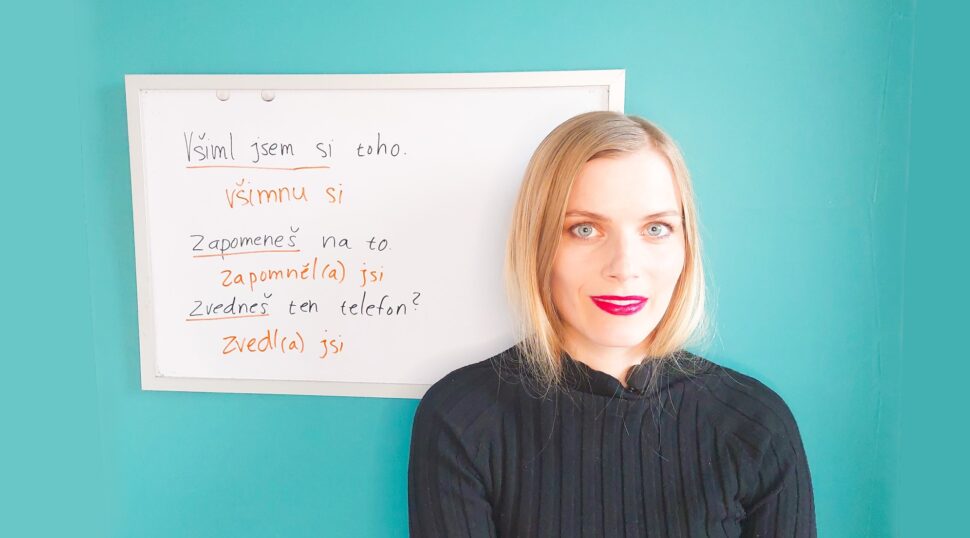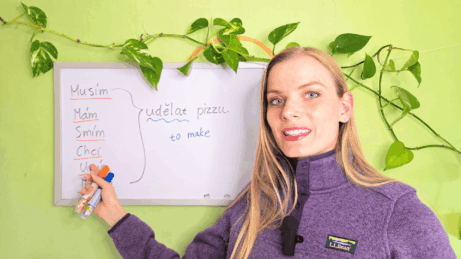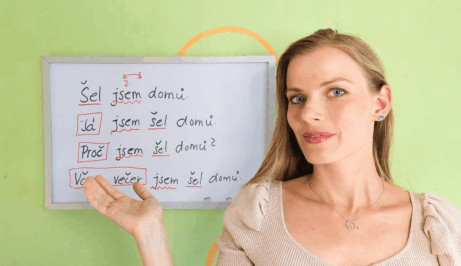
How to Use Czech Verbs Ending in -OUT
“Oh, it’s one of those verbs. I never know how to deal with them!” my student tells me as soon as we come across spadnout (to fall). It belongs to this peculiar category of verbs that learners seem to be a bit afraid of, maybe rightfully so. It’s confusing when it comes to their conjugation until you take a closer look at them and realize there is nothing scary about verbs with the infinitive ending in –out. This group is often neglected although it is quite important. So, let me show you how to use these verbs.
How frequent are these verbs?
Some of these verbs are very common in everyday conversation. We often talk about how something turned out (Jak to dopadlo?), forgetting something (Zapomněla jsem na to!), or getting an idea (Něco mě napadlo!). I was curious, so I checked how frequent this specific verb group is and I browsed the frequency list at Korpus (www.korpus.cz/lists). I went through the 500 most frequently used verbs in written Czech and found 36 verbs ending in -out among them. I also checked the 500 most common verbs in spoken Czech and found 34 verbs ending in -out. Ok, that might feel like few to you but it’s not something we should neglect.
How to use these verbs
One useful thing to know about these verbs is that the vast majority are perfective verbs. That means those verbs only have a future and past tense. Let’s learn some of these verbs in context.
1. Když to nestihneme do 5 minut, budeme muset schůzku trochu natáhnout.
If we can’t get it done within 5 minutes, we’ll have to extend the meeting a bit.
Future Tense: STIHNOUT
já stihnu
ty stihneš
on stihne
my stihneme
vy stihnete
oni stihnou
Just by looking at these forms, you will immediately spot that there is no out from the infinitive form. So, the key to the right conjugation of these verbs is this:

Remove -out from the infinitive: stihn-out, and add the endings that are common for the fourth conjugation group in the present tense (such as the verb jít). If you are not familiar with the verb conjugation in the present tense, you can watch this video or purchase my worksheet.
Let’s try it with the verb “natáhnout” from the sentence above. Make the future tense in ty-form (= you will extend, stretch):
(ty) natáhneš
Excellent! What about the past tense? It’s not complicated either. Let me show you how to conjugate the verb stihnout in the past tense:
Past Tense: STIHNOUT
já stihl jsem / stihla jsem
ty stihl jsi / stihla jsi
on stihl
ona stihla
ono/to stihlo
my stihli jsme
vy stihli jste
oni stihli
What are your thoughts? Not only is -out out, but n as well! Remember, for the past tense, remove –nout from the infinitive form: stih-nout, and add the regular ending for the past tense. (I also have an extensive worksheet for the Czech past tense, available here.)
Interesting note: In spoken Czech, we like to “mess” things up a bit—for our own good (an easier pronunciation)! Try saying stihl and you will see that a bit of help wouldn’t hurt. What do natives do? a) not pronounce the -l at the end: stih’, or b) insert an extra syllable (nu): stihnul. So if a Czech wants to say: I made it (managed time-wise), it would most likely sound like this: Stihnul jsem to! (or Stih jsem to). This only happens in the singular masculine forms (já, ty, on, or singular vy). This is a common practice in spoken Czech but it is not proper use. Do not write like this, unless the context is informal (e.g. a text to a friend).
Let’s see another example in context:
2. Nakonec to proběhlo bez problémů a všechno dobře dopadlo.
In the end, it went smoothly and everything turned out well.
Can you tell me the infinitive forms of these verbs? Take a look above at the past tense conjugation.
Proběhnout and dopadnout are the infinitive forms!
3. Stáhnu si ty dokumenty, než zase spadne internet.
I will download those documents before the internet goes down again.
The infinitive forms of these verbs are: stáhnout; spadnout. If this sentence was in the past tense, it would look like this: Stáhl(a) jsem si ty dokumenty, než zase spadl internet.
4. Všiml jsem si, že vznikly jisté problémy, a rozhodl jsem se navrhnout řešení.
I noticed that certain problems arose and decided to propose a solution.
The infinitive forms are: všimnout si and rozhodnout se.
A quick check to see if you’ve been digesting this well: Say “I proposed a solution.”
The proper version is: Navrhl jsem řešení. The natives might say: Navrhnul jsem řešení. (or Navrh jsem)
5. Záchranáři zasáhli včas a poskytli pomoc.
Rescuers intervened in time and provided help.
The infinitive forms are: zasáhnout and poskytnout.
6. Ráda bych si sedla a až večera se nezvedla.
I would like to sit down and not get up until the evening.
The infinitive forms are: sednout si and (ne)zvednout se.
This is going all too well, don’t you think? Therefore, it is time to unleash the beasts (irregular verbs) and disturb the peace. Take a look at this sentence:
7. Zapomněla jsem jeho jméno a vzpomněla jsem si až druhý den!
I forgot his name and only remembered it the next day!
The infinitive forms of the verbs above are: zapomenout and vzpomenout si. If we followed our rule: zapome-nout, the past tense in já-form would be: zapomela jsem. However, we don’t like the sound of that, so we add an extra n and háček over ě (to make it look cool). The same thing happens with the verbs vzpomenout si and připomenout (remind). The good thing is, the future tense is regular.
zapomenout: já zapomenu (but já jsem zapomněl(a))
vzpomenout si: já si vzpomenu (but já jsem si vzpomněl(a))
připomenout: já připomenu (but já jsem připomněl(a))
Don’t feel bad, even Czechs often forget how to spell these verbs in the past tense (some incorrectly write zapoměl).
Ready for another disturber of the peace? Here we go:
8. Kandidát nás zaujal, a proto jsme ho přijali.
The candidate caught our interest and that’s why we accepted him.
The infinitives are: zaujmout and přijmout. There is m instead of n! It means that, for the past tense, we have to modify our rule, yet again. Já jsem zaujl doesn’t sound right, so we put an extra vowel, a, in all the past forms. This applies to most of the verbs that finish in –mout, such as:
zaujmout (catch interest): zaujal jsem (já)
přijmout (accept): přijal jsem
pronajmout (rent): pronajal jsem
obejmout (hug): objal jsem
zajmout (capture): zajal jsem
I can hear you: ‘Wait a minute… Why did you say ‘most of the verbs that finish in -mout‘, Zuzka?‘
Zuzka: (nervous laugh): ‘Sejmout (knock off, remove): sejmul jsem or sňal jsem‘
When in doubt, consult with the Internet Language Reference Book (Příručka).
Here is the good news: the future tense is regular: já zaujmu, přijmu, obejmu, zajmu and sejmu (-out is out applies here too).
If you’ve read this far, I think you should give yourself a pat on the shoulder. You are awesome!
If your head is spinning and you’re about to throw your device out of the window, here is the last straw that could break your back (but I truly hope it won’t):
As I said at the beginning of this article, the vast majority of these verbs are perfective. So, what are these mysterious imperfective verbs ending in –out? I will be happy to reveal some of them.
plout (sail, float)
tisknout (print)
chladnout (cool down)
mrznout (freeze)
vládnout (rule)
lesknout se (shine, gleam)
táhnout (pull, drag)
These verbs are imperfective, which means they also have present tense. All the verbs above are conjugated the same way as the perfective verbs in the future tense, except for plout (we will take a look at that one soon).
Present Tense: TISKNOUT
já tisknu (I print, I’m printing)
ty tiskneš
on tiskne
my tiskneme
vy tisknete
oni tisknou
The future tense is made by adding the auxiliary verbs budu, budeš, bude, budeme, budete, budou to the infinitive form, e.g. Budu tisknout (I’ll be printing).
The past tense works in the same way as the verbs ending in -nout I showed you at the beginning of this post: tiskl jsem, mrzl jsem…
What is so special about plout? It has a different conjugation that works like the third conjugational verb group (e.g. pracovat).
Present Tense: PLOUT
já pluju / pluji (I sail, I’m sailing)
ty pluješ
on pluje
my plujeme
vy plujete
oni plujou / plují
One funny thing is (I swear it’s the last one in this article) that we have a couple of perfective verbs ending in -out that also have this conjugation. There are not many of them but I thought you would appreciate it if I told you how to say ‘take the shoes off’ expressed by a single verb: zout se, or ‘put the shoes on’: obout se. As you might know, we Czechs are very peculiar about (not) wearing shoes in the house.
Future Tense: ZOUT SE / OBOUT SE
já zuju se (I will take off my shoes); obuju se (I will put on my shoes)
ty zuješ se; obuješ se
on zuje se; obuje se
my zujeme se; obujeme se
vy zujete se; obujete se
oni zujou se; obujou se
This is all I want to share with you regarding this topic. As a reward, let’s do an exercise.
Exercise
In this exercise, you will replace the verbs in the future tense with the past tense and wise-versa (change the past tense into the present tense).
- Všiml jsem si toho. I noticed that.
- Zapomeneš na to. You will forget about it.
- Nic z toho ji nezaujme. None of this will interest her.
- Zahlédli jsme ho z okna. We caught a glimpse of him from the window.
- Jak to dopadlo? How did it go (end up)?
- Sedli si vedle mě. They sat next to me.
- Sáhl si na samé dno! He hit rock bottom!
- Pes se vrhne na jídlo. The dog will jump on the food.
- Zvedneš ten telefon? Will you pick up that phone?
- Nikdo mi to nepřipomene. No one will remind me.

Solutions
- Všiml jsem si toho. → Všimnu si toho.
- Zapomeneš na to. → Zapomněl(a) jsi na to.
- Nic z toho ji nezaujme. → Nic z toho ji nezaujalo.
- Zahlédli jsme ho z okna. → Zahlédneme ho z okna.
- Jak to dopadlo? → Jak to dopadne?
- Sedli si vedle mě. → Sednou si vedle mě.
- Sáhl si na samé dno! → Sáhne si na samé dno!
- Pes se vrhne na jídlo. → Pes se vrhl na jídlo. (or informally: vrhnul)
- Zvedneš ten telefon? → Zvedl(a) jsi ten telefon? (or informally for the masculine gender: zvednul)
- Nikdo mi to nepřipomene. → Nikdo mi to nepřipomněl.
I hope that despite all the funny business, you have learned a lot and will remember how to use some of these practical verbs in different forms. If you found this helpful, please share, comment on this post, or leave a comment below my YouTube video. Thank you so much for your attention!








